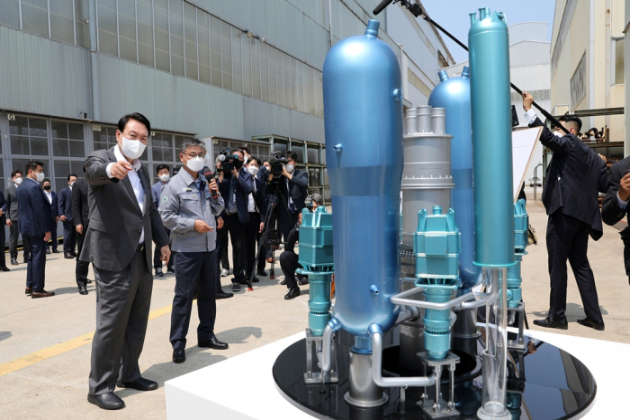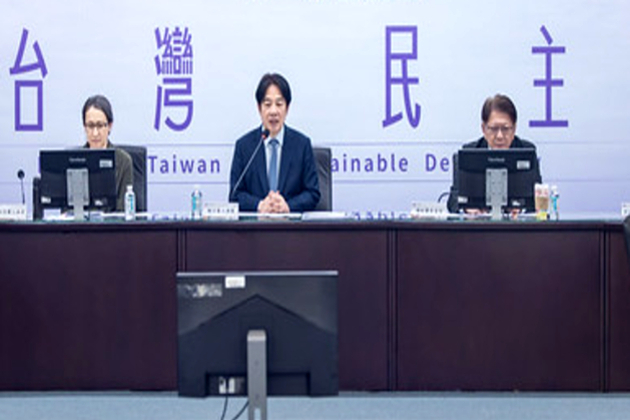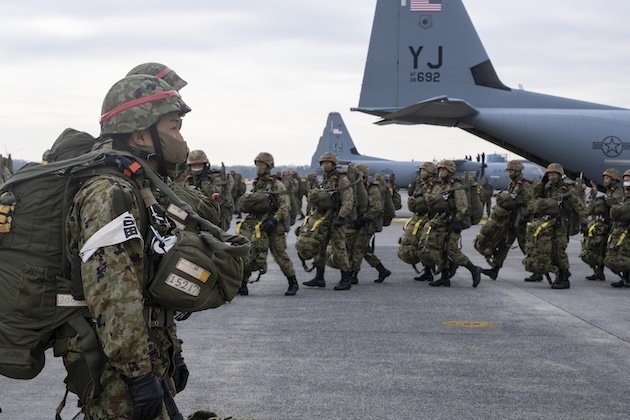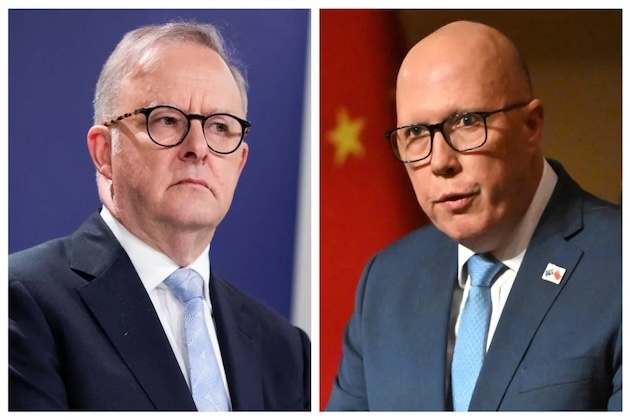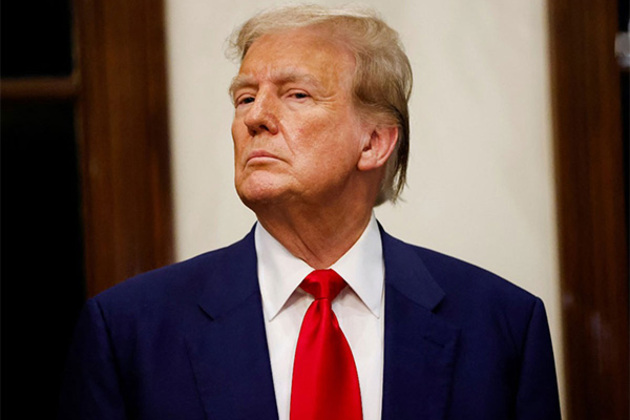Full text of 14th BRICS Summit Beijing Declaration(1)
Xinhua
23 Jun 2022, 22:48 GMT+10

BEIJING, June 23 (Xinhua) -- The 14th BRICS Summit on Thursday issued the Beijing Declaration.
Following is the full text of the declaration. XIV BRICS Summit Beijing DeclarationPreamble
1. We, the Leaders of the Federative Republic of Brazil, the Russian Federation, the Republic of India, the People's Republic of China and the Republic of South Africa held the XIV BRICS Summit under the theme "Foster High-quality BRICS Partnership, Usher in a New Era for Global Development" on 23-24 June 2022.
2. We recall that in the past 16 years, upholding the BRICS spirit featuring mutual respect and understanding, equality, solidarity, openness, inclusiveness, and consensus, BRICS countries have strengthened mutual trust, deepened intra-BRICS mutually beneficial cooperation, and closer people-to-people exchanges, which has led to a series of significant outcomes. We reiterate the importance of further enhancing BRICS solidarity and cooperation based on our common interests and key priorities, to further strengthen our strategic partnership.
3. We are glad to note that despite the COVID-19 pandemic and other challenges, BRICS countries in 2022 have jointly continued enhancing solidarity and deepening cooperation on, inter alia, economy, peace and security, people-to-people exchanges, public health, and sustainable development by holding a series of meetings and activities, and contributed to tangible outcomes of BRICS cooperation.
4. We welcome the High-level Dialogue on Global Development at this Summit as a testimony to the open and inclusive nature of BRICS Partnership including BRICS Outreach/BRICS Plus cooperation. We look forward to the Dialogue injecting new impetus to strengthen international cooperation and solidarity on implementing the 2030 Agenda for Sustainable Development.Strengthening and Reforming Global Governance
5. We reiterate our commitment to multilateralism through upholding international law, including the purposes and principles enshrined in the Charter of the United Nations as its indispensable cornerstone, and to the central role of the United Nations in an international system in which sovereign states cooperate to maintain peace and security, advance sustainable development, ensure the promotion and protection of democracy, human rights and fundamental freedoms for all, and promoting cooperation based on the spirit of mutual respect, justice and equality.
6. Recalling the BRICS Joint Statement on Strengthening and Reforming the Multilateral System adopted by our Foreign Ministers in 2021 and the principles outlined therein, we agree that the task of strengthening and reforming multilateral system encompasses the following:
-Making instruments of global governance more inclusive, representative and participatory to facilitate greater and more meaningful participation of developing and least developed countries, especially in Africa, in global decision-making processes and structures and make it better attuned to contemporary realities;
-Being based on inclusive consultation and collaboration for the benefit of all, while respecting sovereign independence, equality, mutual legitimate interests and concerns to make the multilateral organizations more responsive, effective, transparent and credible;
-Making multilateral organizations more responsive, effective, transparent, democratic, objective, action-oriented, solution-oriented and credible, so as to promote cooperation in building international relations based on the norms and principles of international law, and the spirit of mutual respect, justice, equality, mutual beneficial cooperation and realities of the contemporary world;
-Using innovative and inclusive solutions, including digital and technological tools to promote sustainable development and facilitate affordable and equitable access to global public goods for all;
-Strengthening capacities of individual States and international organizations to better respond to new and emerging, traditional and non-traditional challenges, including those emanating from terrorism, money laundering, cyber-realm, infodemics and fake news;
-Promoting international and regional peace and security, social and economic development, and preserve nature's balance with people-centered international cooperation at its core.
7. We recall the UNGA Resolution 75/1 and reiterate the call for reforms of the principal organs of the United Nations. We recommit to instill new life in the discussions on reform of the UN Security Council and continue the work to revitalize the General Assembly and strengthen the Economic and Social Council. We recall the 2005 World Summit Outcome document and reaffirm the need for a comprehensive reform of the UN, including its Security Council, with a view to making it more representative, effective and efficient, and to increase the representation of the developing countries so that it can adequately respond to global challenges. China and Russia reiterated the importance they attach to the status and role of Brazil, India and South Africa in international affairs and supported their aspiration to play a greater role in the UN.
8. We appreciate the role of India and Brazil as members of the UN Security Council for 2021-2022 and 2022-2023 respectively. The presence of four BRICS countries in the UN Security Council provides an opportunity to further enhance the weight of our dialogue on issue of international peace and security and for continued cooperation in areas of mutual interest, including through regular exchanges amongst our permanent Mission to the United Nations and in other international fora.
9. We reiterate the need for all countries to cooperate in promoting and protecting human rights and fundamental freedoms under the principles of equality and mutual respect. We agree to continue to treat all human rights including the right to development in a fair and equal manner, on the same footing and with the same emphasis. We agree to strengthen cooperation on issues of common interests both within BRICS and in multilateral fora including the United Nations General Assembly and Human Rights Council, taking into account the necessity to promote, protect and fulfil human rights in a non-selective, non-politicised and constructive manner and without double standards. We call for the respect of democracy and human rights. In this regard, we underline that they should be implemented on the level of global governance as well as at national level. We reaffirm our commitment to ensuring the promotion and protection of democracy, human rights and fundamental freedoms for all with the aim to build a brighter shared future for the international community based on mutually beneficial cooperation.
10. We stress that global economic governance is of critical importance for countries to ensure sustainable development and recall further our support for broadening and strengthening the participation of emerging markets and developing countries (EMDCs) in the international economic decision-making and norm-setting processes. We reiterate our support for G20's leading role in global economic governance and underline that G20 shall remain intact and respond to current global challenges. We call upon the international community to foster partnerships while underlining that it is imperative to strengthen macro-policy coordination in driving the world economy out of the crisis and shaping a strong, sustainable, balanced and inclusive post-pandemic economic recovery. We urge major developed countries to adopt responsible economic policies, while managing policy spillovers, to avoid severe impacts on developing countries.
11. We reaffirm our support for an open, transparent, inclusive, non-discriminatory and rules-based multilateral trading system, as embodied in the World Trade Organization(WTO). We will engage constructively to pursue the necessary WTO reform to build an open world economy that supports trade and development, preserve the pre-eminent role of the WTO for setting global trade rules and governance, supporting inclusive development and promoting the rights and interests of its members, including developing members and LDCs. We recognize that special and differential treatment as established in WTO rules is a tool to facilitate the achievement of WTO objectives with respect to economic growth and development. We call upon all WTO members to avoid unilateral and protectionist measures that run counter to the spirit and rules of the WTO. We emphasize the top priority and urgency of launching the selection process of the Appellate Body members to restore the binding two-tier multilateral dispute settlement mechanism. We agree that the Appellate Body crisis should be resolved without further delay and should not be linked with other issues. We endorse BRICS Statement on Strengthening the Multilateral Trading System and Reforming the WTO. We commend the successful conclusion of MC12 that underscores the value of multilateralism. We encourage WTO members to sustain momentum and achieve further meaningful outcomes by MC13.
12. We reaffirm our commitment to maintaining a strong and effective Global Financial Safety Net with a quota-based and adequately resourced IMF at its center. We call for the timely and successful completion of the 16th General Review of Quotas by 15 December 2023, to reduce the IMF's reliance on temporary resources, to address under-representation of emerging markets and developing countries (EMDCs) for their meaningful engagement in the governance of IMF and protect the voice and quota shares of the poorest and smallest members. We welcome progress on voluntary channeling of Special Drawing Rights (SDRs) from countries with strong external positions to support countries most in need, as well as the IMF's decision to establish the Resilience and Sustainability Trust (RST). We look forward to early operationalization of the RST.
13. We note that the COVID-19 pandemic has caused serious shock and hardship to humanity, unbalanced recovery is aggravating inequality across the world, the global growth momentum has weakened, and the economic prospects have declined. We are concerned that global development is suffering from severe disruption, including the widening North-South development gap, divergent recovery trajectories, pre-existing developmental fault-lines and a technological divide. This is posing huge challenges to the implementation of the 2030 Agenda for Sustainable Development as economic and health scarring, particularly for EMDCs, is projected to persist beyond the current pandemic. We urge major developed countries to adopt responsible economic policies, while managing policy spillovers, to avoid severe impacts on developing countries. We encourage multilateral financial institutions and international organizations to play a constructive role in building global consensus on economic policies and preventing systemic risks of economic disruption and financial fragmentation. We welcome the actions to accelerate the progress towards achieving the 2030 Agenda for Sustainable Development.Working in Solidarity to Combat COVID-19
14. We reiterate that it was imperative to ensure the availability of safe, efficacious, accessible and affordable diagnostics, medicines, vaccines and essential medical products to people from different countries especially developing countries, and equitable distribution of vaccines and expeditious vaccination, to fill the immunization gap globally. We support the leading role of the WHO in combating the pandemic, as well as acknowledge initiatives such as the COVAX and the ACT-A. We recognize the importance of the discussions in the WTO on relevant IP waiver proposals, as well as capacity building and strengthening local production of vaccines and other health tools, especially in developing countries. We stress the need to continue to strengthen the cooperation on testing methods, therapeutic, research, production and recognition of vaccines, the research on their efficacy and safety in light of new variants of COVID-19 virus and recognition of national document of vaccination against COVID-19 and respective testing, especially for purpose of international travel.
15. We reaffirm our commitment to multilateralism and continue to support World Health Organization (WHO) to play the leading role in the global health governance, while supporting other UN relevant agencies' activities. The BRICS countries will strengthen technical multilateral cooperation aimed at enhancing capacities in the fields of responding to major public health emergencies, Universal Health Coverage (UHC), vaccine research and development, prevention & therapeutic health care and digital health systems. We agree to deepen existing cooperation through establishing closer cooperation ties among BRICS health institutions and exploring opportunities for joint collaborative projects in the health sector.
16. We welcome the convening of the BRICS High-Level Forum on Traditional Medicine.
17. We stress that BRICS countries should be better prepared for COVID-19 and future public health emergencies, and enhance exchanges and cooperation on public health emergency alert, pandemic prevention preparedness and response, and best practices in medical treatment. We welcome the virtual launch of the BRICS Vaccine Research and Development Center and commend the "Initiative on Strengthening Vaccine Cooperation and Jointly Building a Defensive Line against Pandemic". We welcome the participation of other countries, especially EMDCs, in the Center to upgrade capacity for controlling and preventing infectious diseases. We support and emphasize the urgent need for the establishment of the BRICS Integrated Early Warning System for preventing mass infectious diseases risks in accordance with the International Health Regulations (2005) and the WHO's Global Outbreak Alert and Response Network, and emphasize that BRICS countries should jointly take proactive and effective measures to prevent and reduce the risk of cross-border transmission of infectious diseases and contribute to improving global health.
18. We support continuing to hold the BRICS TB Research Network Meetings, which will contribute to achieving the WHO goal of ending TB by 2030. We support the early signing of the Memorandum of Understanding on Cooperation in the Field of Regulation of Medical Products for Human Use among our drug regulatory authorities and welcome the holding of a BRICS Seminar of Officials and Experts in Population Development in the second half of 2022.
19. We call on international agencies and philanthropists to procure vaccines and boosters from manufacturers in developing countries, including in Africa, to ensure that the manufacturing capabilities being developed are retained. This is critical to build health system resilience and preparedness for emerging variants and any future health emergencies including pandemics. In this context access to diagnostics and therapeutics is essential to adopt quality and affordable medical countermeasures and develop overall surveillance capabilities.Safeguarding Peace and Security
20. We welcome the BRICS Joint Statement on "Strengthen BRICS Solidarity and Cooperation, Respond to New Features and Challenges in International Situation" adopted by our Foreign Ministers on 19 May 2022, and the 12th Meeting of BRICS National Security Advisers and High Representatives on National Security, held on 15 June 2022, and commend their fruitful discussions on various strategic issues.
21. We commit to respect the sovereignty and territorial integrity of all States, stress our commitment to the peaceful resolution of differences and disputes between countries through dialogue and consultation, support all efforts conducive to the peaceful settlement of crises.
22. We have discussed the situation in Ukraine and recall our national positions as expressed at the appropriate fora, namely the UNSC and UNGA. We support talks between Russia and Ukraine. We have also discussed our concerns over the humanitarian situation in and around Ukraine and expressed our support to efforts of the UN Secretary-General, UN Agencies and ICRC to provide humanitarian assistance in accordance with the basic principles of humanity, neutrality and impartiality established in UN General Assembly resolution 46/182.
23. We strongly support a peaceful, secure and stable Afghanistan while emphasizing the respect for its sovereignty, independence, territorial integrity, national unity and non-interference in its internal affairs. We emphasize the need for all sides to encourage the Afghanistan authorities to achieve national reconciliation through dialogue and negotiation, and to establish a broad-based and inclusive and representative political structure. We reaffirm the significance of relevant UNSC resolutions. We emphasize that the Afghan territory not to be used to threaten or attack any country or to shelter or train terrorists, or to plan to finance terrorist acts, and reiterate the importance of combating terrorism in Afghanistan. We call on the Afghanistan authorities to work towards combating drug-related crime to free Afghanistan from the scourge of drugs. We stress the need to provide urgent humanitarian assistance to the Afghan people and to safeguard the fundamental rights of all Afghans, including women, children, and different ethnic groups.
24. We reiterate the need to resolve the Iranian nuclear issue through peaceful and diplomatic means in accordance with the international law, and stress the importance of preserving the JCPOA and the UNSCR 2231 to international non-proliferation as well as wider peace and stability and hope for success of diplomatic efforts towards the resumption of the JCPOA.
25. We express our support for negotiations in bilateral and multilateral formats to resolve all issues pertaining to the Korean Peninsula, including its complete denuclearization, and maintaining peace and stability in Northeast Asia. We reaffirm the commitment to a comprehensive peaceful, diplomatic and political solution to the situation.
26. We reaffirm our commitment to a peaceful and prosperous Middle East and North Africa. We stress the importance of addressing development and security challenges in the region. We call on the international community to support efforts aimed at the stability and peace in the region.
27. We commend efforts of African countries, the African Union and sub-regional organizations to address regional challenges, including maintaining peace and security, post conflict reconstruction as well as development efforts, and call for continued support by the international community to them. We emphasize the collaboration of AU and UN in accordance with the UN Charter.
28. We call for continued efforts to strengthen the system of arms control, disarmament and non-proliferation treaties and agreements and to preserve its integrity for maintaining global stability and international peace and security, and stressed further the need to maintain the effectiveness and efficiency as well as the consensus-based nature of the relevant multilateral instruments in the field of disarmament, non-proliferation and arms control.
29. We call for strengthening the system of arms control, disarmament and non-proliferation, including the Convention on the Prohibition of the Development, Production and Stockpiling of Bacteriological (Biological) and Toxin Weapons and on their Destruction (BTWC) and the Convention on the Prohibition of the Development, Production, Stockpiling and Use of Chemical Weapons and on Their Destruction (CWC), and for preserving their integrity and effectiveness to maintain global stability and international peace and security. We underline the need to comply with and strengthen the BTWC, including by adopting a legally binding Protocol to the Convention that provides for, inter alia, an efficient verification mechanism. We reassert our support for ensuring the long-term sustainability of outer space activities and prevention of an arms race in outer space (PAROS) and of its weaponization, including through negotiations to adopt a relevant legally binding multilateral instrument. We recognize the value of the updated Draft Treaty on the Prevention of the Placement of Weapons in Outer Space, the Threat or Use of Force against Outer Space Objects (PPWT) submitted to the Conference on Disarmament in 2014. We stress that practical Transparency and Confidence-Building Measures (TCBMs), may also contribute to PAROS.
30. We reaffirm our commitment to a world free of nuclear weapons and stress our strong commitment to nuclear disarmament and our support to the work on this subject during the session of 2022 of the Conference on Disarmament. We note the Joint Statement of the Leaders of the People's Republic of China, the French Republic, the Russian Federation, the United Kingdom of Great Britain and Northern Ireland, and the United States on Preventing Nuclear War and Avoiding Arms Races on 3 January 2022, in particular the affirmation that a nuclear war cannot be won and must never be fought.
31. We reaffirm our commitment to the promotion of an open, secure, stable, accessible and peaceful ICT-environment, underscored the importance of enhancing common understandings and intensifying cooperation in the use of ICTs and Internet. We support the leading role of the United Nations in promoting constructive dialogue on ensuring ICT-security, including within the UN Open-Ended Working Group on security of and in the use of ICTs 2021-2025, and developing a universal legal framework in this realm. We call for a comprehensive, balanced, objective approach to the development and security of ICT products and systems. We underscore the importance of establishing legal frameworks of cooperation among BRICS countries on ensuring security in the use of ICTs. We also acknowledge the need to advance practical intra-BRICS cooperation through implementation of the BRICS Roadmap of Practical Cooperation on ensuring security in the use of ICTs and the activities of the BRICS Working Group on security in the use of ICTs.
32. We, while emphasizing the formidable potential of the ICTs for growth and development, recognize new associated possibilities they bring for criminal activities and threats, and expressed concern over the rising level and complexity of criminal misuse of ICTs. We welcome the ongoing work in the UN Open-Ended Ad Hoc Committee of Experts to elaborate a comprehensive international convention on countering the use of ICTs for criminal purposes and reaffirm our commitment to cooperating in the implementation of the mandate adopted by the UN General Assembly resolution 75/282.
33. We express strong condemnation of terrorism in all its forms and manifestations whenever, wherever and by whomsoever committed. We recognize the threat emanating from terrorism, extremism conducive to terrorism and radicalization. We are committed to combating terrorism in all its forms and manifestations, including the cross-border movement of terrorists, and terrorism financing networks and safe havens. We reiterate that terrorism should not be associated with any religion, nationality, civilization or ethnic group. We reaffirm our unwavering commitment to contribute further to the global efforts of preventing and countering the threat of terrorism on the basis of respect for international law, in particular the Charter of the United Nations, and human rights, emphasizing that States have the primary responsibility in combating terrorism with the United Nations continuing to play central and coordinating role in this area. We also stress the need for a comprehensive and balanced approach of the whole international community to effectively curb the terrorist activities, which pose a serious threat, including in the present-day pandemic environment. We reject double standards in countering terrorism and extremism conducive to terrorism. We call for an expeditious finalization and adoption of the Comprehensive Convention on International Terrorism within the UN framework and for launching multilateral negotiations on an international convention for the suppression of acts of chemical and biological terrorism, at the Conference of Disarmament. We welcome the outcomes of the Seventh BRICS Counter-Terrorism Working Group Plenary Meeting and its five Subgroup Meetings. We commend the Chair for hosting the Seminar on Targeted Financial Sanctions Related to Terrorism and Terrorist Financing, and look forward to organization of the Seminar on Strengthening Counter-Terrorism Capacity Building in Developing Countries, and the BRICS Police Training Program. We also look forward to further deepening counter-terrorism cooperation.
34. We look forward to further deepening counter-terrorism cooperation and reaffirm the sole authority of the UN Security Council for imposing sanctions and call for further consolidation and strengthening of the working methods of UN Security Council Sanctions Committees to ensure their effectiveness, responsiveness and transparency, while avoiding politicization of any of their proceedings including listing proposals objectively on evidence-based criteria.
35. We reaffirm our commitment to strengthening international cooperation against corruption. While respecting the legal systems of our respective countries, we are committed to strengthening experience sharing and practical cooperation on issues related to anti-corruption law enforcement, including on pursuit of economic and corruption offenders, on mutual legal assistance in civil and administrative matters, and on asset recovery. We welcome the BRICS Initiative on Denial of Safe Haven to Corruption. We will further strengthen anti-corruption capacity building through education and training programs and enhance anti-corruption exchanges and cooperation within multilateral frameworks. We welcome the first BRICS Anti-corruption Ministerial Meeting.
36. We are concerned about the serious drug situation in the world and reiterate our commitment to the existing international drug control mechanism underpinned by the three United Nations Drug Control Conventions and the various political commitments. We appreciate BRICS Anti-Drug Working Group's active role in combating transnational drug trafficking and promoting global drug governance and will further strengthen drug control cooperation. (more)
 Share
Share
 Tweet
Tweet
 Share
Share
 Flip
Flip
 Email
Email
Watch latest videos
Subscribe and Follow
Get a daily dose of China National News news through our daily email, its complimentary and keeps you fully up to date with world and business news as well.
News RELEASES
Publish news of your business, community or sports group, personnel appointments, major event and more by submitting a news release to China National News.
More InformationBusiness
SectionWall Street sheds nearly 6% more as tariffs continue to take toll
NEW YORK, New York - The rout in U.,S. and global stock markets continued and even heightened on Friday, as investors around the world...
FCC investigates Disney, ABC amid diversity policy scrutiny
WASHINGTON/LOS ANGELES: The U.S. government is intensifying scrutiny of corporate diversity policies, with Disney and ABC now under...
US states compete for role in smaller next-gen nuclear power
HARRISBURG, Pennsylvania: New, cheaper nuclear power is on the way, and U.S. states are competing to build and supply the next generation...
Taiwan's President Lai gathered officials ahead of Trump's tariffs speech
TAIPEI, Taiwan: Taiwan's leadership was on high alert ahead of the U.S. tariff announcement, with President Lai Ching-te convening...
Gold goes past $3,100 amid global uncertainty, inflation fears
WASHINGTON, D.C.: Gold surged past US$3,100 an ounce on March 31, extending a record-breaking rally fueled by global uncertainty and...
U.S. and world stocks tumble, Nasdaq Composite drops nearly 6%
NEW YORK, New York - U.S. stock markets plunged on Thursday in reaction to major trade tariffs announced by U.S. President Donald Trump....
Asia Pacific
SectionHegseth calls Japan key to countering China, military upgrade planned
TOKYO, Japan: U.S. Defense Secretary Pete Hegseth said Japan is essential for handling China's aggression, especially in the Taiwan...
Taiwan's President Lai gathered officials ahead of Trump's tariffs speech
TAIPEI, Taiwan: Taiwan's leadership was on high alert ahead of the U.S. tariff announcement, with President Lai Ching-te convening...
Toyota’s global output rises as Japanese buyers return
TOKYO, Japan: Toyota is showing signs of a steady rebound in its home market, posting a second straight month of rising global output...
South Korea’s worst wildfires kill 28, destroy historic temples
ANDONG, South Korea: Wildfires in South Korea have doubled in size in just one day, making them the country's worst fire disaster....
Survey shows ALP would win Federal election if held now
MELBOURNE, Victoria - If a federal election were held today, the Australian Labor Party (ALP) would be re-elected with an increased...
"We do not want TikTok to go dark": Trump extends deadline by 75 days
Washington DC [US], April 5 (ANI): US President Donald Trump on Friday said that his administration had been working on a deal to 'save...



